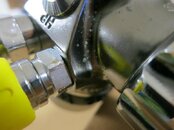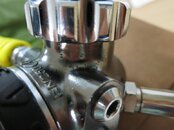Hi All, I have a first stage that has internal corrosion (was accidentally flooded before) and external corrosion, its minor but I can see that the corrosion has started and it has the potential to get a lot worst.
I recently showed it to a dive service man, he said he can do a full overhual, ultrasound cleaning and also part change to remove the all corrosion and the affected corroded parts. I have no doubt that can be done and I will most probably get back a first stage that looks like brand new.
Since the corrosion has already started on the inside and outside of the first stage, and I assumed it had broke through the first stage's coating, my question is, will the corrosion still occur in the future if I were to go for the full servicing and ultrasound cleaning? With the consideration that from now on the first stage will be properly maintain (no more flooding), rinse and soak (hot water) after every dive.
I was afraid that nothing will change and the first stage will immediately begin its corroding process right after all this servicing and it will just be a waste of $$..
I recently showed it to a dive service man, he said he can do a full overhual, ultrasound cleaning and also part change to remove the all corrosion and the affected corroded parts. I have no doubt that can be done and I will most probably get back a first stage that looks like brand new.
Since the corrosion has already started on the inside and outside of the first stage, and I assumed it had broke through the first stage's coating, my question is, will the corrosion still occur in the future if I were to go for the full servicing and ultrasound cleaning? With the consideration that from now on the first stage will be properly maintain (no more flooding), rinse and soak (hot water) after every dive.
I was afraid that nothing will change and the first stage will immediately begin its corroding process right after all this servicing and it will just be a waste of $$..





